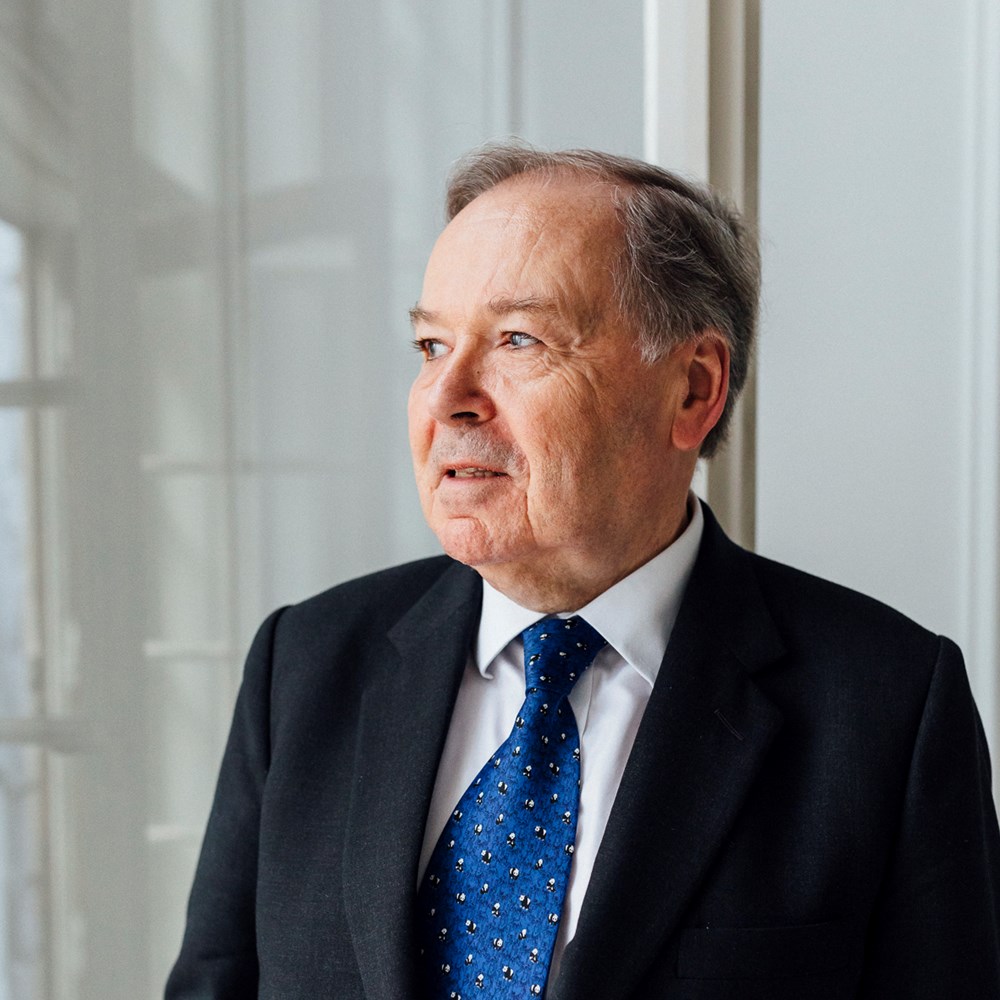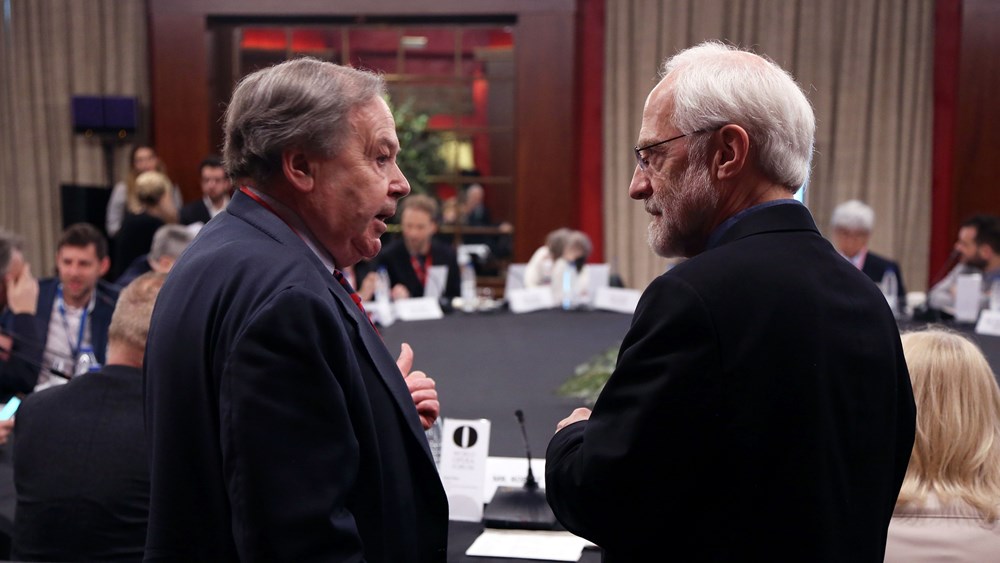Finale at Opera Europa

After two decades at the helm of Opera Europa, OPERA America’s European partner organization, Nicholas Payne will be stepping down as director. His CV also includes the trifecta of running three of the U.K.’s leading opera companies: Opera North, the Royal Opera House, and English National Opera. Payne sat down with Alejandra Martí, executive director of Ópera Latinoamérica, OPERA America’s partner organization in Latin America, to reflect on his career.
Alejandra Martí: Tell me about your earliest experiences with opera. When did you first become interested in it?
Nicholas Payne: My first opera was Don Giovanni at Glyndebourne. I was 11 years old, and I can recall the performance well. It was designed by a remarkable painter-architect, John Piper. It was a stimulating picture, and I remember the appearance of the Commendatore at the end, through the walls, as being a cataclysmic effect. There was one great singer in the cast, Sena Jurinac singing Donna Anna. Even at the age of 11, it was obvious to me that she was in a different class from the rest.
I made it my business over the next year or two to learn all the Mozart operas. Throughout my teenage years and university and so on, opera certainly took up an increasing part of my attention. Still, in terms of unintentionally equipping me for the job I was going to do, it was useful preparation.
Martí: You joined Opera Europa in 2003, a year after its founding. What was the organization like at that time?
Payne: When I inherited the organization, we had 36 members. In two years, we doubled that, and today we have 220 members. But it’s not really my achievement. We have to remember that an opera association is only as good as its members. The job is partly to listen to what their needs are, but it’s also to anticipate those needs and to think, “This is the topic that should be worrying European opera houses next year or the year after that.”
Martí: Did OPERA America provide inspiration for Opera Europa in those early days?
Payne: Yes. One of the first things I did, in the summer of 2003, was to get on a plane to Washington, D.C., and spend three days in the offices of OPERA America, asking Marc [Scorca, president and CEO] questions. I said, quite openly, “Look, I know nothing about doing this, but I know you’ve been running OPERA America successfully for 12 years. What can I learn?” And he was very good, because he didn’t say, “Oh, you’ve got to do it this way.” Needless to say, there are some things I stole from OPERA America, some things I adapted for Europe, and some things I decided not to do at all.
Martí: Aside from growing the membership, what would you consider your most important legacy at Opera Europa?
Payne: On the whole, opera companies have become better at collaborating rather than being rivals. I suppose, if you want a single word, the answer is “trust.” I now realize why they appointed me 20 years ago, even though I knew nothing about running an association, or a conference, or a database. It was because I had run U.K. opera companies for 30 years, and I know what the job is. I’ve struggled with budgets, I’ve struggled with singers’ cancellations. So I could understand a company’s problem, whether it was a human relations problem or a union issue, and offer two or three possible solutions.
Martí: One of your major accomplishments was developing the streaming platform OperaVision. What is the future of streaming opera in Europe?
Payne: During the years of the pandemic, it was certainly a lifeline. But it has never been our intention that OperaVision should replace going to live opera, and my experience is that it doesn’t. Every time there has been a new invention, going back to the gramophone and then the long-playing record, the television, people have said, “Oh, this is the end of live theater.” But it’s not been true. Our experience in Europe with companies that do a lot of streaming — Covent Garden, Milan, Vienna — is that it hasn’t decreased audiences. But we have to be very careful to keep that balance, to make sure digital and live performances feed one another. We live in a competitive entertainment world, and whether your performances are streaming or in the theater, you have to think the whole time about what’s going to grab the audience.

Martí: In 2013, you founded the Opera Management Course, a professional development program for opera administrators. Why was this important?
Payne: When I was 23 and new in this profession, I worked in a very junior capacity at Covent Garden as the lowest paid cost accountant you’ve ever come across. The people at the top of the organization, the general director, the deputy, the head of planning, the production director, all found time to talk to me. I learned more about how you plan an opera season from spending three days in the office of Joan Ingpen, the legendary head of planning in those days, than I could conceivably have learned from any book.
I wanted to create an environment in which other people could get that opportunity, similar to OPERA America’s Leadership Intensive. When you are in your mid-20s, you are not going to know everything about finance and budgeting and planning and technical and marketing and fundraising. That would be unrealistic. What you need to teach in the Leadership Intensive or Opera Management Course is the importance of those basic skills.
Martí: What has been the most challenging moment for you at Opera Europa?
Payne: The war in Ukraine has been the worst experience I’ve had in my time. In a conceptual way, it’s because there is this idea that Europe is a peaceful nation. Coming together, sharing experiences, productions, good practices... that is what we call the European project. For people of my generation, Europe is an emotional construct because our parents went through two world wars. The coming together of Europe was a promise that that would never happen again. And then it happens.
On a personal level, I know the people who run the Russian theaters. They’re friends. Most of them absolutely hate the war, and some of them have been quite brave and have put their names to petitions against it. So, I feel an emotional bond with them, but I’ve had to say to all of them that so long as this war lasts, you have in effect been suspended from taking part in Opera Europa activities.
Martí: What comes next for you?
Payne: I’m not seeking another job, if that’s what you mean [laughs]. I’ve been lucky to have had a busy life continuously working in opera since I was in my 20s, and I couldn’t have asked for better. But it means there are lots of things I’ve neglected or haven’t done, and I look forward to catching up with all those other things. Maybe I’ll find I have time to visit parts of the world that I’ve never visited. But I hope there will be fewer early flights to some remote part of Europe. I won’t be sorry to give that up!
This article was published in the Fall 2022 issue of Opera America Magazine.

Alejandra Martí
Alejandra Martí is the executive director of Ópera Latinoamérica, the service organization for opera in Latin America, and the co-founder de Escena Digital.




